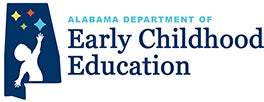
The Alabama Pre-K-3rd Grade Integrated Approach to Early Learning Competitive Grant Process is now open. Click the Apply Now button above for the application.
Pre-K – 3rd Grade Early Learning Continuum
The Alabama Pre-K–3rd Grade Integrated Approach to Early Learning builds upon student success and narrows the achievement gap by expanding access to Alabama’s high-quality pre-k model. It takes the most successful parts of early learning initiatives to establish a strong foundation of early learning experience that promotes student achievement and success.
The Alabama Department of Early Childhood Education works in collaboration with the Alabama State Department of Education to establish a strong early learning foundation for the children of Alabama. This will be accomplished through a comprehensive, systematic approach to high-quality learning opportunities using the pre-k-3rd framework and early learning continuum. This collaborative partnership will develop and implement a strong teaching and learning continuum unique to the needs and expectations of Alabama children and families.
A high-quality early education provides the foundation for student success in school. Having a seamless learning continuum from pre-k to 3rd grade will align and integrate a comprehensive education approach to student learning during the years when children have the greatest growth potential. Creating a high-quality early learning continuum requires a strong commitment by principals and all educators to work together to ensure that all the needs of children are met. Taken together, research findings from multi-year early education interventions suggest that the combined components of the pre-k–3 approach can make a positive contribution to young children’s learning by providing the pathways through which more children will achieve success by the end of third grade.
Research has shown that the key elements of effective pre-k–3rd grade programs include:
- High-quality, voluntary pre-k for children
- Full-day kindergarten
- Qualified teachers who have a bachelor’s degree and specialized training in the methods in which young children learn
- Opportunities for teachers to share data and participate in joint planning sessions on a regular basis, as well as collaborative professional development across grade levels
- Strong leadership committee to providing children with seamless high-quality educational experiences
- A high-quality, developmentally appropriate curriculum that aligns state standards from pre-k through 3rd grade and supports the development of the whole child
The basic framework and three focus areas of the early learning continuum are based on:
Leadership
- Leaders embrace the pre-k-3rd early learning continuum
- Leaders ensure developmentally appropriate practices
- Leaders provide personalized, blended learning environments
- Leaders use measures to guide growth in student learning
- Leaders build professional capacity across the early learning community
- Leaders make schools a hub for pre-k–3rd learning for families and communities
Instruction
- Align and coordinate standards, curriculum, instructional practices, assessment, environments, and professional development to create an incremental alignment plan for pre-k–3rd
- Use consistent yet developmentally appropriate instructional approaches across grades
- Require horizontal and vertical team meetings
- Use instructional coaches with early childhood learning experiences and credentials
- Communicate proactively and involve parents, families, and the community
Assessment
- Ongoing comprehensive system to include diagnostic, formative/progress monitoring, and summative assessments
- Include all domains of development and learning: social, language, physical, cognitive, literacy, mathematics, social studies, science and technology, and the arts
- Processes and resources for cross-sector work are established through shared leadership, strategic planning, research, and evaluation, as well as funding and finance mechanisms.
- As a supporting strategy for this collaborative, the Alabama Reading Initiative will be implemented on the foundational principles of the original 1998 ARI program. The initiative continues to focus intensely on three major aspects of teaching of reading: implementing strategies focused on proactively preventing reading difficulties, identifying struggling readers and intervening to help them become proficient readers, and expanding the reading power of all students. We will focus on providing intensive professional learning opportunities for teachers and coaches.
- In addition, we will strengthen our collaboration with schools of education to ensure pre-service teachers enter our classrooms with the skills needed to positively impact student learning through rigorous instruction. Emphasis will be placed on strengthening reading instruction by adding pre-k and continuing through the 3rd Another new aspect will be a “reading mastery” summer camp for children who are not reading on grade level at the conclusion of the school year. This intervention will be led by highly skilled and effective teachers. We will include a component that allows struggling teachers to learn alongside master teachers.
If you have questions regarding the P-3 initiative, please contact Ami Brooks, Director of Innovative Projects & Assessment, by phone (334) 334-531-5972 or via email ami.brooks@ece.alabama.gov.

